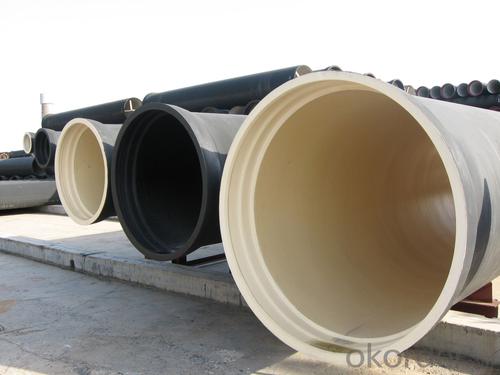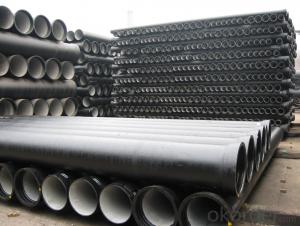Ductile Iron Pipe DN1800
OKorder Service Pledge
Quality Product, Order Online Tracking, Timely Delivery
OKorder Financial Service
Credit Rating, Credit Services, Credit Purchasing
You Might Also Like
Specifications
Quick Details
| Place of Origin: | China (Mainland) | Brand Name: | CMAX | Model Number: | T type / K type / Flange type |
| Length: | 6m / 5.7m / Negotiable | Standard: | ISO2531 / EN545 / EN598 | Application: | Potable / Sewage water |
| Diameter: | DN80~DN2200 | Shape: | Round | Hardness: | 230 |
| Pipe Wall Thickness: | standard | Pull Strength: | 420 | Yield (≥ MPa): | 300 |
| Material: | Ductile Iron | Type: | Centrifugal ductile cast iron pipe | Certification: | ISO2531 / EN545 / EN598 |
| Outer Diameter: | 80-2200 | Thickness: | standard | Specification: | DN80~DN2200 |
| |
The advantages to the customer:
Trustworthy financial strength.
One-stop shopping.
Fast and efficient service.
Coordination of shipments from multiple plants.
Specialists of the overseas shipping process.
A more competitive price.
- Q: Can ductile iron pipes be used in nuclear power plants?
- Yes, ductile iron pipes can be used in nuclear power plants. Ductile iron is a type of cast iron that has improved flexibility and strength compared to traditional cast iron pipes. These pipes are known for their durability, corrosion resistance, and ability to withstand high pressure and temperature conditions. In nuclear power plants, where there is a need for a reliable and robust piping system to transport water, coolant, and other fluids, ductile iron pipes can be a suitable choice. However, it is important to note that the specific requirements and regulations of each nuclear power plant should be considered before selecting the pipe material. Proper testing, certification, and compliance with nuclear industry standards should be ensured to guarantee the safe and efficient operation of the power plant.
- Q: Are ductile iron pipes suitable for mining applications?
- Ductile iron pipes are indeed suitable for mining applications. This type of cast iron has undergone treatment to enhance its strength, durability, and ductility. Notably, these pipes possess high tensile strength and corrosion resistance, making them an ideal choice for underground mining operations that face harsh conditions. The ability of ductile iron pipes to withstand high pressure and heavy loads is one of their key advantages in mining applications. They exhibit excellent structural integrity and can withstand both internal and external forces, ensuring reliable performance in demanding mining environments. Moreover, ductile iron pipes have a long service life and require minimal maintenance. They offer exceptional resistance to abrasion, which is extremely important in mining operations where abrasive materials such as rocks, minerals, and ores are prevalent. Additionally, the smooth inner surface of these pipes minimizes friction, allowing for efficient transportation of mining materials. Furthermore, ductile iron pipes are a cost-effective option compared to alternatives like steel or concrete. They have a lower upfront cost and require less frequent replacements, resulting in reduced long-term expenses for mining companies. In conclusion, ductile iron pipes are highly suitable for mining applications due to their strength, durability, resistance to corrosion and abrasion, long service life, and cost-effectiveness. These pipes ensure reliable and efficient transportation of mining materials, thereby contributing to the overall efficiency and productivity of mining operations.
- Q: What is the maximum allowable joint deflection for ductile iron pipes?
- The maximum allowable joint deflection for ductile iron pipes is typically specified by industry standards and guidelines. These standards may vary depending on the specific application and local regulations. In general, the maximum allowable joint deflection for ductile iron pipes is usually limited to a range between 1% to 5% of the pipe diameter. This means that the pipe can typically tolerate a deflection of up to 1% to 5% of its diameter without causing any significant damage or compromising its structural integrity. However, it is important to note that the exact maximum allowable joint deflection may vary depending on factors such as pipe size, wall thickness, and operating conditions. It is recommended to consult the relevant industry standards, such as those published by the American Water Works Association (AWWA) or the International Organization for Standardization (ISO), for specific guidelines on maximum allowable joint deflection for ductile iron pipes in a given application.
- Q: How are ductile iron pipes protected against external corrosion?
- Ductile iron pipes are protected against external corrosion through a combination of manufacturing processes and external coatings. The first line of defense is the inherent corrosion resistance of ductile iron itself. The iron is treated with a special alloying element, typically magnesium, which forms a protective layer on the surface of the pipe. This layer acts as a barrier against corrosion and helps to extend the lifespan of the pipe. In addition to the corrosion-resistant properties of the iron, ductile iron pipes are also externally coated with protective materials. One common method is to apply a layer of asphaltic or bituminous coating to the pipe's surface. This coating acts as a barrier against moisture and corrosive substances in the soil, preventing them from coming into contact with the iron. It also provides a layer of insulation, reducing the likelihood of galvanic corrosion. Another method of external corrosion protection is the use of fusion-bonded epoxy (FBE) coatings. FBE is a thermosetting resin that is applied to the surface of the pipe and then heat-cured to form a strong and durable coating. This coating provides excellent resistance against corrosion, abrasion, and impact, making it a popular choice for ductile iron pipes in harsh environments. In some cases, additional protective measures such as cathodic protection systems may be employed. These systems use electric currents to counteract the corrosion process by supplying electrons to the pipe's surface. This helps to prevent corrosion from occurring, especially in areas where the coating may have been damaged or compromised. Regular maintenance and inspection are also crucial in ensuring the long-term protection of ductile iron pipes against external corrosion. This includes periodic cleaning, repair of any coating damages, and monitoring the integrity of the protective layers. Overall, the combination of the inherent corrosion resistance of ductile iron, external coatings, and maintenance practices ensures that ductile iron pipes are well-protected against external corrosion, allowing them to have a longer lifespan and deliver reliable performance in various applications.
- Q: Are ductile iron pipes resistant to microbiologically induced corrosion?
- Generally, ductile iron pipes exhibit resistance to microbiologically induced corrosion (MIC). Ductile iron, a variant of cast iron, undergoes treatment involving the addition of magnesium to enhance its strength and flexibility. Consequently, this process forms a protective layer on the iron's surface, rendering it less prone to corrosion initiated by microorganisms. MIC arises when specific bacteria, fungi, or other microorganisms interact with the metal surface of pipes, producing corrosive byproducts. Nevertheless, ductile iron generally resists MIC due to the presence of the protective layer, which acts as a barrier, thus preventing direct contact between microorganisms and the metal surface. Furthermore, ductile iron pipes are often coated with cement mortar or other protective coatings, further bolstering their corrosion resistance. These linings supply an additional layer of defense against microorganisms, reducing the likelihood of MIC. Nevertheless, it is crucial to note that the extent of resistance to MIC can vary depending on the specific conditions and environment in which the pipes are installed. Factors such as water quality, temperature, and the presence of certain microorganisms can influence the susceptibility of ductile iron pipes to MIC. Consequently, it is imperative to consider these factors and implement appropriate measures to prevent MIC. This may include regularly monitoring water quality, maintaining the pipes properly, and employing corrosion inhibitors or biocides when necessary.
- Q: Method for cutting cast iron pipe
- Depends on the material and the use of requirements. Ordinary gray iron, if the incision is not strict, such as water pipes. They are all sheared with hydraulic cutting machine, but the incision will not be very smooth. If it is ductile iron, and the incision requirements are high, it can only be used plasma cutting machine. General fittings, if not specifically required, shall not be cut by machining methods.
- Q: Do ductile iron pipes require internal linings for potable water?
- Internal linings are not required for potable water in ductile iron pipes. Ductile iron, a type of iron that has been strengthened and made more flexible, is commonly used in water distribution systems due to its durability and resistance to corrosion. Unlike cast iron or steel, ductile iron pipes have a protective cement-mortar lining. This lining acts as a strong barrier against corrosion and prevents the release of harmful substances into the water. It is applied during the manufacturing process and is designed to withstand the corrosive properties of potable water, eliminating the need for internal linings. Furthermore, the smooth surface of ductile iron pipes ensures the quality and flow of water without the necessity of additional linings.
- Q: What is the expected corrosion protection system for ductile iron pipes?
- Typically, the expected corrosion protection system for ductile iron pipes involves a combination of external coatings, internal linings, and cathodic protection. To protect against corrosion, external coatings are applied to the pipe's exterior surface. These coatings, usually fusion-bonded epoxy, polyethylene, or polyurethane, act as a barrier against corrosion from soil, water, and chemicals. Furthermore, they play a crucial role in prolonging the pipe's lifespan. In order to safeguard against corrosion caused by the transported fluid, internal linings are applied to the pipe's interior surface. These linings, which can be made of cement mortar, epoxy, or polyurethane, provide a smooth and protective layer that prevents the formation of rust and scale. Cathodic protection is an electrochemical technique employed to shield ductile iron pipes from corrosion. It involves the utilization of sacrificial anodes or impressed current systems to generate a protective electrical current that counteracts the corrosion process. By employing this method, the formation of rust is prevented, thereby extending the pipe's longevity. It is important to acknowledge that the specific corrosion protection system for ductile iron pipes may differ depending on the application and environmental factors. To determine the appropriate corrosion protection system for a specific ductile iron pipe installation, consulting with corrosion experts and adhering to industry standards and guidelines is of utmost importance.
- Q: Ductile iron gears are generally treated without heat treatment
- The mechanical properties of ductile iron are equivalent to quenched and tempered steel. The gears made of ductile iron can be quenched or tempered by high temperature + surface quenching, that is, quenching and tempering treatment + surface hardening.
- Q: How can the old water pipe ductile iron pipe be opened with three flanges?
- First, the new process adopted; groove connection. With groove pieces, of course, ductile iron pipes should also be grooved pipes.Two, the old process1. dozen to lead lead; cut into strips, with a file play in the interface2. use expanded cement with asbestos3 use the asphaltBecause the interface material used in the old process is poisonous, especially in the water supply pipeline, environmental protection requires a new process now.
Send your message to us
Ductile Iron Pipe DN1800
OKorder Service Pledge
Quality Product, Order Online Tracking, Timely Delivery
OKorder Financial Service
Credit Rating, Credit Services, Credit Purchasing
Similar products
Hot products
Hot Searches
Related keywords























